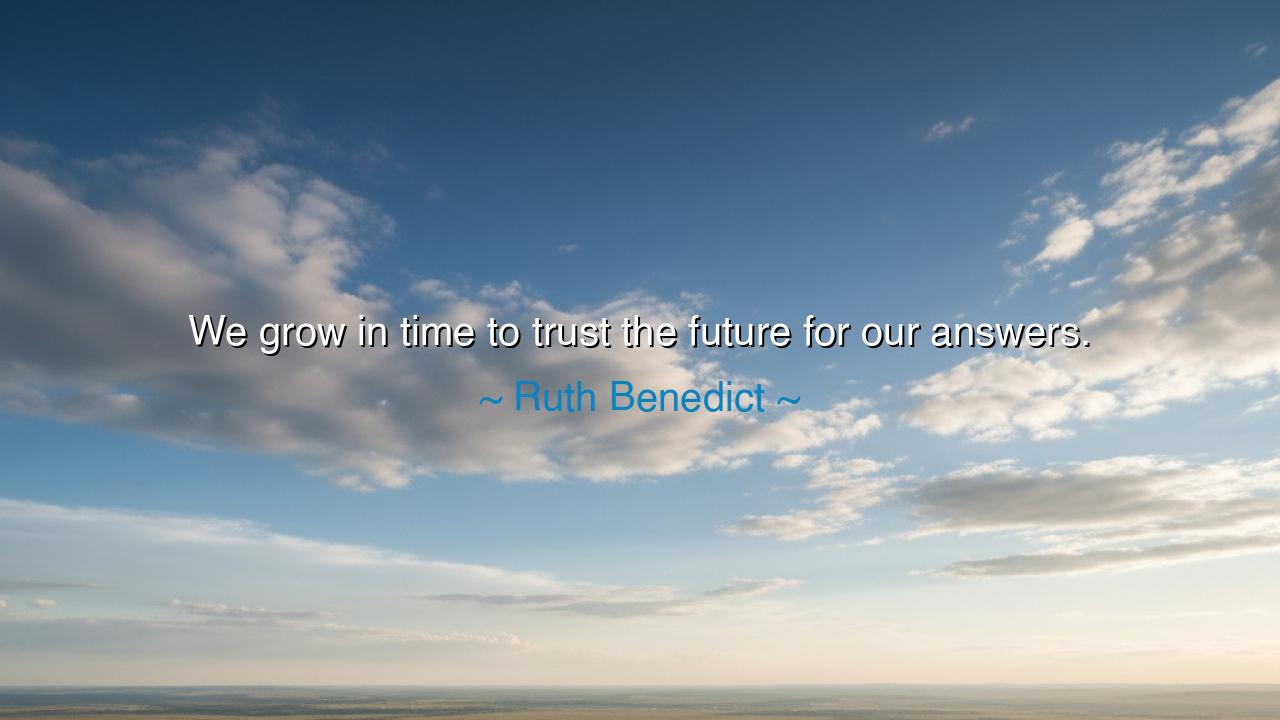
We grow in time to trust the future for our answers.






When Ruth Benedict spoke the words, “We grow in time to trust the future for our answers,” she offered a profound reflection on the nature of growth and the mystery of life’s unfolding. Her words remind us that trusting the future is not an act of passive surrender, but of wisdom, cultivated over time. We learn, through experience, that life is not something to be understood all at once, but something that must be met with patience, faith, and the courage to let it unfold. Benedict’s message is timeless: we are not meant to have all the answers today, for the answers we seek may lie in the unfolding moments of tomorrow.
The ancients understood this truth in their own way. The great philosopher Heraclitus spoke of the ever-changing nature of the world. He believed that everything flows—nothing remains fixed or certain. As water carves its path through stone, so does time carve our understanding. Heraclitus taught that we must trust in the unfolding of life, even when it seems chaotic or beyond our control. Like the flow of a river, the future is unknown, but it will shape us as we allow it to, and in time, we come to see that the very experiences that once baffled us were part of a larger plan, part of the growth of our soul.
Consider the story of Odysseus, the hero of Homer’s Odyssey. In his long journey home, Odysseus faced countless challenges: shipwrecks, monsters, temptations. At every turn, he was forced to trust the future—he could not control what was ahead, but he could control how he met it. And so, with unwavering determination, he endured, growing wiser with each trial. The answers to his struggles did not come immediately, but over the course of time, they revealed themselves. He trusted that his experiences—no matter how painful or confusing—would eventually lead him home. In this, Odysseus embodies the very essence of Benedict’s words: we grow in time to trust the future.
Similarly, consider the life of Nelson Mandela, whose early years were filled with resistance, imprisonment, and struggle. The answers he sought—answers about justice, equality, and freedom—did not come quickly. Yet, over the years, his fight for these ideals deepened, and the future unfolded before him in ways he could never have imagined. Through his endurance and trust in the future, he ultimately helped dismantle apartheid in South Africa. Mandela’s journey illustrates that sometimes, we must endure hardships and trust that the answers will come—not in the way we expect, but in the time we are meant to receive them. His life is a testament to the power of patience and faith in the unfolding of time.
Benedict’s wisdom also reflects the understanding that life is a process—not a destination. As the ancients taught, we are always becoming, always evolving. This was a central tenet of Socrates’ philosophy, which held that self-knowledge was the key to wisdom. For Socrates, wisdom came not in knowing everything at once, but in the constant pursuit of understanding. He encouraged others to ask questions, to reflect, and to trust that the answers would come, piece by piece, over time. To trust the future is to trust in the process of becoming—knowing that the experiences we encounter today will shape the wisdom we gain tomorrow.
In a more modern context, Maya Angelou, the great poet and author, speaks to this same idea. She writes, “I can be changed by what happens to me, but I refuse to be reduced by it.” Like Benedict’s insight, Angelou’s words reveal that while we may not control what comes to us in life, we can trust that through our growth, we will find the answers we need. The future may not always look the way we envision, but if we meet it with strength and faith, it will reveal its lessons in its own time.
The lesson, then, is one of trust—a trust that the future, though unknown, will offer us the answers we seek. Time is a teacher, and in its passing, we find the wisdom we could not see in the moment. Patience is required, for the answers often come in pieces, in ways we do not expect. But trust in the process, and know that the wisdom we need will unfold, piece by piece, as we move forward. The future is not a place to fear; it is a place to trust and to grow.
Therefore, when faced with uncertainty or struggle, remember Benedict’s wisdom: trust the future for the answers. Embrace each day as part of your journey of growth. Let time unfold its lessons with patience and faith, knowing that in the end, the answers will come. Like Odysseus, like Mandela, and like the philosophers of old, trust in the process of becoming, for in time, the future will reveal itself as your guide. Growth is not an immediate revelation; it is the journey we undertake, step by step, in trust and in faith.






AAdministratorAdministrator
Welcome, honored guests. Please leave a comment, we will respond soon